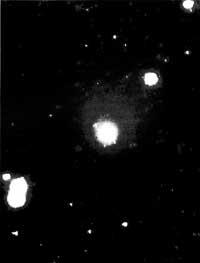Hale-Bopp, is it a spectacle of this century?
However, the events that have occurred in recent years around the comets have not fulfilled the forecasts, such as the 1993 Perseids, the comet Halley or the shock that Shomaker-Levy 9 had to make against Jupiter.
Repeated warnings from scientists may be checked. Hale-Bopp is an important comet coming from afar. His name, like all comets, is formed by the surnames of the first observers. In this case, two people met at the same time on 23 July 1995. Alex Hale is a professional astronomer and, apparently, an astronomer Thomas Bopp who has not lost his eternal hobby.

As has been said, comet Hale-Bopp can be one of the most important of this century. When they discovered the comet and began to investigate it, they realized that it moved very slowly through the firmament, so they concluded that it should still be far from the Sun. According to the first calculations of their orbit, they placed it further than Jupiter. However, its magnitude in 10 was 1 so it was very bright for these distances. They also saw him directly with a telescope, without using photographs. This also serves to indicate the importance of the kite.
When calculating 2 the absolute magnitude of the Hale-Bopp comet, the value -2'4 is obtained. Just as the luminosity of the stars is measured, this number gives us the measure of the brightness of the object and the smaller and negative it is, the greater the brightness of the star. The brightness of a kite, therefore, is very high. In recent centuries only four comets have a magnitude equal to or less than 0.
It is not easy to place comet Hale-Bopp on this list. It must be done according to the size of the kite and, unfortunately, nobody knows for sure. Some researchers believe that its diameter is 10-15 km, but others believe it can be 240 km. The cause of this uncertainty is ignorance of the actual state of the comet. For many, the explosion in the coma is the only cause of its splendor. According to this hypothesis, at the end of this explosion the magnitude of the comet would decrease again. Despite this theory, most scientists believe that the magnitude of the comet is extraordinary.
Therefore, we are faced with two different hypotheses: one that says that Hale-Bopp is a giant comet and another that postulates that in the coma a big explosion is occurring.
As mentioned above, Comet Hale-Bopp has aroused great interest in what was followed extensively from the beginning. A month after the first observation of the comet, they carefully calculated their orbit by photographs. Once the first photographs were studied, on April 27, 1993, it was found in a photo of the part of the firmament in which the comet should be, as an object of magnitude 18.
Steps of Comet Hale-Bopp

Until the last days of October, Hale-Bopp. Thereafter, the comet is in conjunction with the Sun and becomes invisible from the ground. In February 1996 it will again be visible in the southern hemisphere. At the end of February it will cross the orbit of Jupiter and be visible from southern Europe. If at the time of its reappearance the magnitude is equal to or greater than 9, it will be really spectacular, but if it is weaker, it will begin to move away from the most optimistic forecasts.
In any case, the brightness of the kite will gradually increase throughout the year and, being optimistic, can reach a magnitude of 6 by the end of June. By the end of 1996 it should be brighter than the famous comet Halley.
In March 1997 the distance between the Earth and the comet will be small and then the Hale Bopp will have greater brightness. However, its magnitude at that time is not yet known, but astronomers see it should be between -4 and 6. However, if there are no surprises between them, it will be brighter than comet Halley and at least visible.
According to the latest data, the comet Hale-Bopp will be large, but as large as was thought at first. Therefore, we will not be able to place Hale-Bopp on the list of the ten brightest comets of the last centuries, but scientists expect that the firmament will offer us an exceptional show in the coming years.
Magnitude 1: This is the value that measures the luminosity of a star. (A high value, 16 for example, means that the luminosity of the star is very weak. If it is 0, it will have a luminosity similar to the brightest stars in the firmament).
Absolute magnitude 2: magnitude of an astro located at a certain distance.
Buletina
Bidali zure helbide elektronikoa eta jaso asteroko buletina zure sarrera-ontzian











